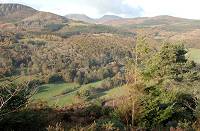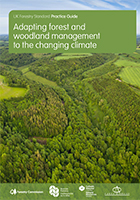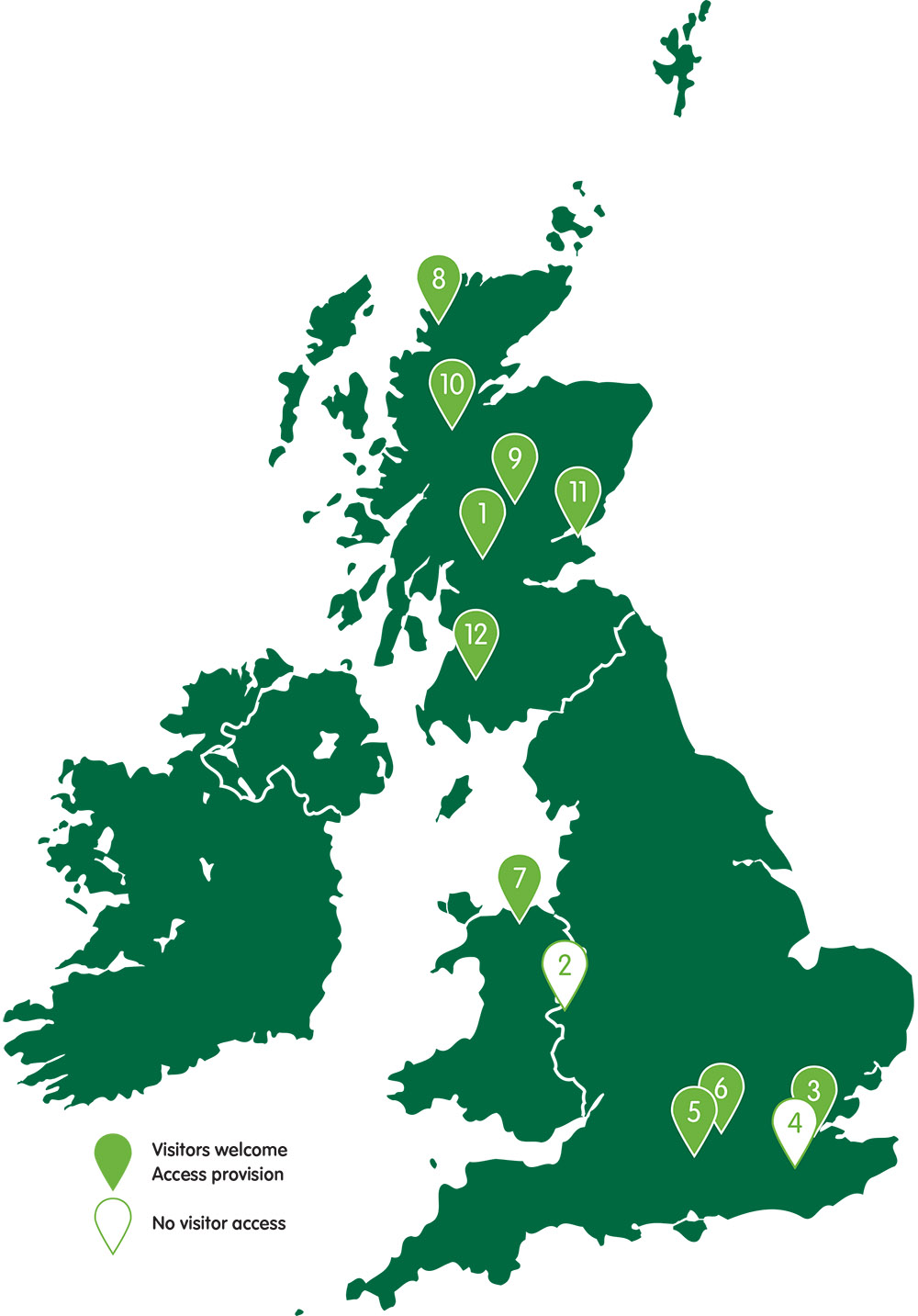Summary
Overview
Why is adaptation important?
Given the magnitude and rate of predicted climate change, trees and woodland will be significantly affected. Adaptation is therefore an important issue and should be addressed at the earliest opportunity. This is particularly the case because of the long time-frame associated with any management decisions made in forestry.
In contrast with other sectors, five, twenty and even 50 years are short-term planning horizons for some elements of woodland management. By the 2080s, an oak tree planted now will only be half-way through a commercial rotation, while as a component of semi-natural woodland, it would still be at a juvenile stage.
The difficulty is ensuring that decisions made now, particularly over planting material, are appropriate to both the current and future climate. Decisions should also not be restricted to the choice of planting material – landscape-level planning is equally relevant, with larger and less fragmented areas of woodland likely to be more robust in the face of any environmental perturbation. Woodland networks will also provide the opportunity for both native fauna and flora to migrate as climate change progresses.
What will be affected first?
Initially, the impacts of climate change are likely to be most serious and apparent in southern England, particularly on the more freely draining soils.
Young and newly established trees, together with street trees and trees in hedgerows are likely to be the first affected.
The productivity of many species will fall, while mortality will increase, both as a result of more frequent and intense summer droughts.
Species suitability will change, and it is therefore important to consider the planting stock in adapting to climate change. Information on species suitability under future climate scenarios is available for England, Scotland and Wales.
Tree species and provenance: information on over 60 species that are either widely grown in British forests at the present time or which could play an increasing role in the future.
Planting stock – species and provenance choice
More southerly provenances and species are likely to be better adapted to the predicted hotter climate of the future, but may not be well adapted to the current climate.
Of particular concern, is the risk of spring frost damage to earlier flushing provenances and species from lower latitudes, as has been the case in the past with species such as southern beech (Nothofagus spp.) and black walnut. Frost damage leads to both reduced potential growth and poor form and timber quality, as demonstrated by the photograph of the early flushing provenance of oak. The phenology of species and provenances planted in anticipation of climate change is thus an important element of their choice.
Growth potential is not the only consideration for climate change adaptation, particularly for ancient or semi-natural woodland. As important are the implications for the genetic resource within Britain, and the fauna and flora comprising the woodland ecosystem. It is therefore essential to consider the principal purpose(s) of the woodland when assessing options for climate change adaptation.
- If timber production is the principal objective, species and provenance should be well adapted to both the current and future predicted climate. Non-native species could be considered, particularly in southern Britain and on more freely draining soils.
- If the retention of high forest for leisure and amenity use is the principal objective, then the considerations should be similar to those for timber production, although a wider range of species could be included.
- If the restoration or maintenance of semi-natural woodland, together with its associated ground flora is the objective, native species should be planted. However, in southern Britain, non-native provenances could be considered and an assessment of the long-term suitability of the woodland type on a given site should be made in the context of the climate change predictions. The character of the associated vegetation community is, however, likely to change.
- If the maintenance of the genetic resource native to Britain in the principal objective, then only seed from native, ancient woodland should be planted. The long-term potential of survival for ‘genetic reserves’ should also be assessed. The translocation of genetic material to colder wetter climates could be considered.
Management of existing woodland
Although the choice of planting stock during restocking, semi-natural woodland restoration and woodland expansion is an important element of climate change adaptation, there are also options for the management of existing woodland.
Productivity across much of the north and west is predicted to rise, both as a result of increased warmth and rising CO2 levels. Rotation length and the timing of thinning may therefore need adjustment, particularly in areas subject to wind damage. Although predictions of changes to the wind climate are far from certain, any changes would have the potential to cause significant damage. The situation could be made worse by the predicted increase in winter rainfall leading to water-logging and reduced stability.
The tools that have been developed to managed forests in the uplands should therefore continue to be used, including an ongoing assessment of wind hazard as climate change progresses.
Increased winter rainfall and water-logging may also require a change in practice, limiting harvesting access to maintain soil structure and limit compaction. In time, establishment practice may need to change, while aftercare of, particularly, amenity and street trees will become more important.
‘No-regret’ options
Some of the steps for climate change adaptation described above involve more significant changes to current practice than others – some will require a major change to the thought processes involved with woodland management.
However, there are a number of basic measures that require little change to best practice and should be considered as no-regret options:
- Species mixtures will provide some insurance against climate change – not all will be affected to the same extent.
- Provenance mixtures will provide insurance.
- Tree species and woodland types should be well matched to site; if currently at the dry end of their suitable range, they should not be planted.
- Climate change predictions should be considered in the choice of planting stock.
- At a landscape level, larger, better connected woodland should be an objective.
Current research projects
- Climate change adaptation in Scotland
- Climate change adaptation in Wales
- Climate change impacts and adaptation in England’s woodlands
- ClimateXChange
- Forest Management Adaption (AdaFor) 2013-2015
Contact
Adapting forests and woodlands in Wales to a future climate


How will climate change affect forests and woodlands in Wales?
Summary
Climate change is now one of the greatest global challenges, and research is under way to establish the likely impacts on many aspects of the environment. Information in these pages provides an initial description of the likely impacts on forests and woodlands in Wales, with preliminary recommendations on how managers might respond and adapt to the challenge.
There are many uncertainties in the extent and range of climate change, and its likely impact on trees, management systems and forest operations. A key basis for risk planning and management is diversification; from broadening the choice of genetic material, mixing tree species in stands, to varying management systems and the timing of operations. An aspiration of the current Wales Woodland Strategy is to increase the proportion of woodlands managed using low impact silvicultural systems. Synergy between this forest policy objective and a ‘no-regrets’ climate change adaptation strategy should help to promote management systems with a lower environmental impact on forest sites, reduce the risk of climate impacts on woodlands through mixed species and age classes, and improve the overall resilience of woodland ecosystems to climate change.
As trees take many decades to mature, foresters must anticipate much further into the future than other land-managers. Although our knowledge about the likely effects of climate change is continually improving, we cannot wait until our predictive research is perfect (it never will be) to develop policies that address climate change.
About the information provided
Information has been compiled from knowledge within the forest scientific community, and from tree species suitability modelling using the decision-support tool Ecological Site Classification (ESC). The work applies future climate emissions scenario projections through ESC climate and site factors to examine likely changes in tree species suitability.
Maps are indicative and use coarse-resolution soil information with future climate variables derived from simulations provided by the United Kingdom Climate Impacts Programme (2002) (UKCIP02) at 5 km resolution. It is very important that the maps are used only to infer trends, and that forest planning for the future climate involves careful site-based and stand-based consideration.
Funders and partners
![]()
![]()
This research is funded by the Forestry Commission Climate Change programme and Forestry Commission Wales.
Forestry Commission policy
Forestry Commission policy on climate change stems from the UK Government’s response to the Kyoto Protocol with the publication of the strategic document on climate change: ‘Climate Change – the UK programme’ published in November 2000. The Forestry Commission and Northern Ireland Forest Service helped to produce this strategy and are responsible for ensuring that our forestry policies and practices allow UK woodlands to withstand the rigours of climate change.
The Wales Woodland Strategy is currently under review and open for public consultation. The consultation document proposes a future vision for the woodlands of Wales to improve the goods and services that woodlands provide to society. This requires adaptive woodland management to maintain resilient habitats that will deliver economic, social, and environmental benefits to the people of Wales. Climate change adaptation will focus on the use of tree species well suited to projected future site and climatic conditions. By using more adapted native species, introducing more mixed species stands, and responding to the challenge of maintaining robust habitat networks, woodland ecosystems in Wales will be better able to cope with climate change.
Publications and reports
Research Notes (English and Welsh language versions)
- Impacts of climate change on forestry in Wales
By Duncan Ray. Forestry Commission Research Note 301
Other publications
Climate change and the future for broadleaved tree species in Britain
By M. Broadmeadow, D. Ray and C. Samuel.
Forestry 78:145-167.
Climate Change and British Woodland
By M. Broadmeadow and D. Ray.
Forestry Commission Information Note 69.
Climate change: Impact on UK Forests
Describes current thinking on the most likely effects of climate change on UK forests and woodlands. It is recommended reading for forest managers and advisers, students and all those with an interest in the consequences of global change to our forests.
Forestry Commission Bulletin 125.
Contact
For further information contact:
Related pages
Useful sites
Case Studies
Adapting forest and woodland management to the changing climate
The following case studies and web resources relate to the UKFS Practice Guide – Adapting forest and woodland management to the changing climate.

Adaptive practice
Each of these studies range in size from small woodlands of three hectares to large forests of nearly 70 000 hectares, and several of the forests can be visited.

- Climate-ready forestry at Queen Elizabeth Forest Park.
Management changes have been implemented across 67,000 ha of forest in Central Scotland to adapt to changing wind, flood and other risks from climate change and to establish a ‘climate ready’ demonstration forest. - Managing a woodland with acute oak decline: Bell Coppice.
Oak dominated high forest, important for conservation and located on the Worcestershire / Shropshire Border. The coppice is being adapted by the landowner to reduce the impact of pest and disease attack (acute oak decline) alongside more direct projected impacts of climate change. Watch the Bell Coppice case study video - Jeskyns mixed broadleaf climate adaptation demonstration.
Adaptation during new woodland creation. A climate change demonstration area of mixed broadleaf woodland planted on former agricultural land in 2006. - Bicentenary project: planning 200 years ahead in Gipps Wood.
A small wood within a large, family owned estate. Adaptation started in 2017 and measures include increasing species diversity and assisted migration of native species to increase resilience and inform future adaptive practice. Watch the Gipps Wood case study video - Demonstrating climate change adaptation in Alice Holt Forest.
Adaptation demonstration areas have been established in broadleaf and conifer stands to address increasing drought risk and changing species suitability in current stands and to inform adaptive practice. - Planning to reduce the future fire risk in Swinley Forest.
A mixed forest located in a densely populated part of southeast England where adaptation measures are being applied to reduce the risk of increasing wildfire. - Transformation to continuous cover forestry at Clocaenog Forest.
An exposed upload forest site where low impact silvicultural systems have been adopted, as part of an adaptation strategy, in an attempt to reduce the risk of storm damage and other climate change impacts on tree growth and survival. - Land management planning in West Sutherland.
Climate resilience and biodiversity conservation are core themes of the land management plan for this 6684 ha area of land owned by Forestry and Land Scotland. Adaptation has begun to restore peatland and establish riparian woodland to create resilient ecosystems. - Sustainable forest management at Kinveachy Caledonian Pinewoods.
The management of deer populations and removal of diseased trees is slowly supporting the natural regeneration of Scots pine and the regeneration of native broadleaves at the site, which in turn provides habitat for protected birds and rare plants. - Steep ground harvesting and landslide prevention: the A82 project
Replacing mature conifer stands with slow growing broadleaved woodland can help stabilise steep slopes and reduce windthrow, minimising the risk of landslides on the A82. Watch the A82 Project video. - Managing for dynamic coastal change at Tentsmuir Forest
Careful management measures are being used at Tentsmuir Forest and the neighbouring nature reserve to increase the resilience of the forest to several climate risks to this low-lying coastal area. - Woodland management planning at Queensberry Estate, Buccleuch
Queensberry Estate has a diverse forest managed for a range of objectives. Further improvements to species and structural diversity are reducing climate change risks.
Additional resources
UK Forestry Authorities
England: Forestry Commission
Scotland: Scottish Forestry
Wales: Natural Resources Wales
Northern Ireland: DAERA
National adaptation programmes
England: Defra
Scotland: Scottish Government
Wales: Welsh Government
Northern Ireland: DAERA
Climate change information
Climate Change Committee – Adapting to a warmer UK
Forest Research – TreeAlert
Forestry Commission Guidance (England) – Managing England’s woodlands in a climate emergency
Independent Assessment of UK Climate Risk (CCRA3) – www.ukclimaterisk.org
International Journal of Climatology – State of the UK climate 2018
LWEC Climate change impacts report cards – Agriculture and forestry, and Biodiversity
Met Office UK climate projections
Observatree – www.observatree.org.uk
Plant Healthy certification scheme – https://planthealthy.org.uk/
Scottish Forestry – Woodland grazing toolbox
UK National Ecosystem Assessment – uknea.unep-wcmc.org
Climate change risks
About Drought – Ecosystem report cards
Scottish Forestry – Assessing herbivore impact in woodlands: An observation-based method
Forest Research – Pest and disease resources
Forestry Commission Research Note – Climate change: impacts and adaptation in England’s woodlands
Forestry Commission Research Note – Impacts of climate change on forestry in Scotland – a synopsis of spatial modelling research
Forestry Commission Research Note – Potential impacts of drought and disease on forestry in Scotland
Forestry Commission Research Note – Species preference of small mammals for direct-sown tree and shrub seeds
Gov.uk – Working with natural processes to reduce flood risk
LWEC Climate change impacts report cards – Agriculture and forestry: Technical Paper 7 – Insects, pests and pathogens of trees
LWEC Climate change impacts report cards – Agriculture and forestry: Technical Paper 8 – Risks for woodlands, forest management and forestry production in the UK from climate change
Natural England / RSPB – Climate change adaptation manual
Increasing tree species diversity
Forest Research – Tree species and provenance
SilviFuture network – www.silvifuture.org.uk
Creating mixed species stands
Forestry Commission Research Note – Encouraging biodiversity at multiple scales in support of resilient woodlands
Forestry Commission Research Note – Converting planted non-native conifer to native woodlands: a review of the benefits, drawbacks and experience in Britain
Davies and Kerr (2015) – Comparing the Costs and Revenues of Transformation to Continuous Cover Forestry for Sitka Spruce in Great Britain
Case study 3 – Woodland creation to highlight climate change adaptation at Jeskyns (see above)
Forest Research – Forest development types
Mason, Stokes and Forester (2021) – Proportions of a pine nurse influences overyielding in planted spruce forests of Atlantic Europe
Choosing tree provenance
Forestry Commission Information Note – Choosing provenance in broadleaved trees
Forestry Commission Scotland Guidance Note – Seed sources for planting native trees and shrubs in Scotland
Forestry Commission Research Report – Genetic considerations for provenance choice of native trees under climate change in England
Forestry Commission Research Note – Choice of silver birch planting stock for productive woodlands
Forestry Commission Information Note – Selecting the right provenance of oak for planting in Britain
Forestry Commission Information Note – The role of forest genetic resources in helping British forests respond to climate change
Using natural regeneration
Forestry Commission Information Note – Using natural colonisation to create or expand new woodlands
Carrying out thinning operations
Case study 5 – Demonstrating climate change adaptation in Alice Holt Forest (see above)
Diversifying structure
Forestry Commission Information Note – Transforming even-aged conifer stands to continuous cover management
Forestry Commission Information Note – Monitoring the transformation of even-aged stands to continuous cover management
Forest Research – The evidence supporting the use of CCF in adapting Scotland’s forests to the risks of climate change
Considering forest and woodland design
Forest Research – Climate matching tool
Establishment and management
Forestry Commission Bulletin – Cultivation of soils for forestry
Climate Change Accord: A call for resilient forests, woods and trees (July 2015) (Adaptation in action: Oakover Nurseries, p12)
Forest Research best practice guidance for land regeneration: Note 20 – Drought-tolerant tree species for land regeneration
Adapting infrastructure
Forestry Commission Practice Guide – Building wildfire resilience into forest management planning
Forestry Commission Technical Note – Reducing greenhouse gas emissions from forest civil engineering
Forestry Commission Technical Note – Extraction route trials on sensitive sites
Forestry Commission Technical Note – Protecting the environment during mechanised harvesting operations
Preparing contingency plans
Forest Research report – The role of contingency planning in climate change adaptation for the forestry sector in Scotland
General Content
What’s of interest
British Woodlands survey 2017 report
What do forest managers want to know about climate change adaptation?
Outputs and guidance
UK Forestry Standard Practice Guide – Adapting forest and woodland management to the changing climate.
Supporting case studies on adaptive practice and useful sources of information.
